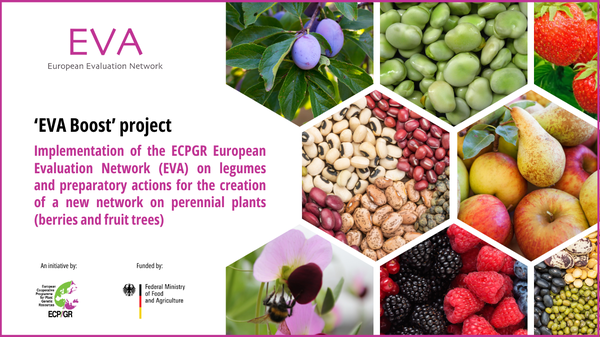Boosting the EVA Networks: a new expansion to legumes and perennial crops
A new project funded by the German Ministry for Food and Agriculture will build on previous successes of the European Evaluation Network (EVA) to unlock the full potential of European plant genetic resources.

The ECPGR European Evaluation Network (EVA) has been operating since 2019 to harness the full potential of plant genetic resources into breeding and cultivation practices. EVA unites public and private sectors to generate standardized evaluation data for crop accessions and landraces in European genebanks.
With crop-specific networks dedicated to carrot, lettuce, maize, pepper, wheat and barley, EVA has already collected over half a million phenotypic data points for more than 5,000 accessions, evaluated for 230 traits in 300 trials across Europe.
Building on this legacy, a new project funded by the German Ministry for Food and Agriculture, EVA Boost, aims to expand the network and reinforce its impact by implementing a new legume network and laying the foundations for a network on perennial plants (fruit trees and berries).
Legumes
In 2023, an ECPGR activity of the Grain Legumes Working Group – ‘forEVA’ – laid the groundwork for a new EVA Legumes network by surveying grain legumes available for evaluation, identifying stakeholders and possible private sector partners, and developing a work plan.
Based on this preparatory activity, within the EVA Boost project the EVA Legumes network will focus on seven crops (common bean, chickpea, fava bean, lentil, lupin, orphan legumes, and pea), targeting traits like disease resistance, drought tolerance and nutritional quality. Collaborating with EU projects such as Bresov, BELIS, INCREASE, and Legume Generation, the network includes 51 organizations from 23 countries, sharing resources and data for characterization and evaluation. In addition to materials extensively genotyped and phenotyped through EU-projects, the network will also create purified lines from underutilized genebank resources, expanding genetic diversity.
Driven by growing interest from stakeholders and breeders, this initiative supports sustainable agriculture and enhances the availability of plant-based proteins, aligning with the EU's Farm to Fork strategy.
Perennials (fruit trees and berries)
The EVA Boost project will also develop a roadmap to establishing a new network focused on perennial plants, particularly berries and fruit trees, building on the work of existing ECPGR Working Groups on Berries, Malus/Pyrus and Prunus. Drawing from past and ongoing European projects and through public–private partnerships, the EVA Network on perennial plants will identify sources of disease resistance in these crops, which face increasing biotic and abiotic stress due to climate change. By identifying resistance traits, the network could reduce the need for phytochemicals, aligning with the European Green Deal’s sustainability goals. The network also aims to increase diversity in marketed fruit varieties, making valuable genebank materials and research data accessible to breeders and growers.
In conclusion, EVA Boost represents a key expansion of the EVA Networks, building on previous successes to unlock the full potential of European plant genetic resources. This initiative will help identify genetic material useful to strengthen agricultural resilience, offering breeders and eventually farmers access to the traits that could meet future challenges while promoting sustainable food production.
For more information, visit the EVA website